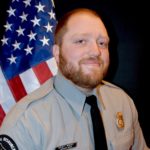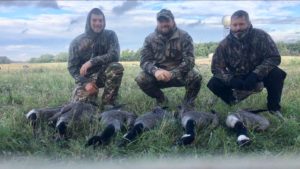An article from WWA’s Words From The Wardens.
This article originally appeared in Wisconsin Waterfowl Association’s September, 2020 eNewsletter.
 By DNR Conservation Warden Taylor Meinholz
By DNR Conservation Warden Taylor Meinholz
With the early goose season on our doorstep, I’d like to share with you how I prepare for one of my favorite times of the year that is as much social as actual hunting.
And it helps to have a patient family and friends. More on that in a bit.
My DNR conservation warden station is in Kenosha County, and I hunt primarily in southeastern areas. However, I have hunted waterfowl all over our state. My hunting started when I was twelve, and I’ve been serious about waterfowl hunting for a decade.
Like you, I treasure my time outdoors anywhere in Wisconsin, but waterfowl hunting is in another category for me. The waterfowl season is a way for me to get together with my friends, recall stories of our past adventures, and create new memories that will become the stories we tell next year.
Equipment Prep: practice, practice, practice
Before the early goose season starts and ushers in the next seasons, I take a close look at my gun.
I clean and maintain my gun. Then I head to the range to test it. This is important as you don’t want any surprises when you’re out. I also see how I’m doing by shooting trap and sporting clays.
Planning the Hunt: manners, manners, manners
Most hunters agree the most important part of the outing is locking down the location. Birds are more comfortable when they have found food and security.
Here’s my general rule: When scouting geese, wherever you see the birds congregating on Friday is where you should hunt on Saturday.
When approaching someone to hunt on their property, remember to be polite and always ask for permission. If you don’t get permission no matter how polite you are, don’t get discouraged. You may talk to ten people and get eight who say no, but you also may get two who say yes.
The Set-Up
When setting up in the field, the most important thing is the hide, which is where the hunter and blinds will be located. If the geese pick you out, it doesn’t matter if you are a champion caller, they will not come close enough for a shot.
Best-case scenario? Set up with the wind and sun at your back. Hopefully, birds will land wings out, feet down at ten yards.
Safety & Regulations
There was no way I would end without reminding all of us of some important safety tips and regulations.
- It is illegal to discharge a firearm within 100 yards of an occupied dwelling.
- Understand daily bag limits, and how they change with season dates.
- Understand the season, including the splits.
- You cannot discharge a firearm within 50 feet from the road, nor from or across a roadway.
- Only take safe shots that you are confident you can make a clean kill.
I wish you all an enjoyable fall hunting season. And if you hear someone practicing their call, it’s just me – I need a lot of practice.
===================================================================================
If you have information regarding natural resource violations, you may confidentially report by calling or texting: VIOLATION HOTLINE: 1-800-TIP-WDNR or 1-800-847-9367. The Hotline is in operation 24 hours a day, 7 days a week. Trained staff relay the reported information to conservation wardens.

